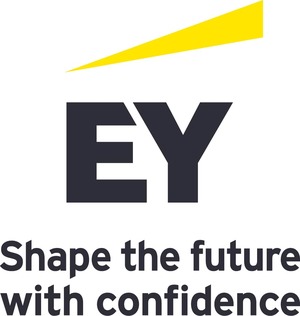Consumers will dictate the future of television, requiring media and entertainment companies to develop closer relationships with viewers
New study from EY identified the six trends driving the future of television as the industry braces for a major shift in monetization and storytelling with ever-expanding array of channels, platforms, devices and experiences
LOS ANGELES, Dec. 17, 2013 /PRNewswire/ -- Viewer demands for control and for new experiences are impacting every aspect of the content supply chain - from story creation through distribution -- according to a new report just issued by EY. The report, Future of Television – Media & Entertainment, identifies six key trends that will drive the future of television in the years ahead. The report also explains that media and entertainment companies will need to more closely measure viewing behavior to create experiences that are interactive, mobile and tailored to viewers' specific needs and interests.
(Logo: http://photos.prnewswire.com/prnh/20130701/NY40565LOGO-b )
EY identified these trends from its analysis of thousands of hours of interviews with executives and thought leaders from media and entertainment companies around the world.
"Media and entertainment companies need to develop much closer relationships with viewers to create deeper engagement with both the content experience as well as advertising," says Howard Bass, Global Media & Entertainment Advisory Services Leader, EY. "Ultimately, it is going to come down to creating compelling content offered in a preference-optimized environment that viewers are willing to pay for directly."
"The story isn't about making content available on multiple platforms", adds Chris Gianutsos, Executive Director, Media & Entertainment Advisory Services, EY. "It's about enabling experiences with compelling content tailored to an audience of one. The relationship between content and viewer is going to get more complex, but potentially also more lucrative."
The six trends driving the future of television are:
- Storytelling will evolve to make better use of an omniplatform environment. The primary screen will not be defined by size, but by what screen captures primary attention. Multiple screens that work seamlessly together will enable new story arcs create greater opportunities for content producers to innovate with their audiences. Metadata that enables synchronization between screens will be a key enabler.
- Ubiquitous screens will demand greater content mobility. As more screens appear in more places – from different rooms in a house to vehicles and public spaces – there will be an increased demand for content that can seamlessly follow the viewer wherever he or she goes. Advertisers will have more screens and greater potential for consumer impressions in this new, multiscreen lifestyle.
- Social dynamics and synergistic experiences will drive more event-based viewing. While the viewing landscape grows increasingly fractured, consumers still want to be part of the collective social experience of events such as the World Cup or the Academy Awards. If content creators can build a strong social experience around a program, viewers will not want to be left out and be driven back to the screen so they can be included.
- Innovation in program discovery and TV controls will drive new techniques to cut through clutter. Despite the evolution of televisions, the channel guide experience has not changed much during the past several decades. Viewers are often frustrated when trying to find something that will appeal to them on television. Tablets and other devices will make program search and discovery more intuitive and tailored to an individual's preferences. Content providers will ultimately have to optimize their content for searching, much like they do for search engines, to enable relevant and appealing content to be pushed to the viewer.
- Bingeing will drive more innovation in measurement and personalization. With the rise of video-on-demand platforms, consumers are now content bingeing (watching several hours of back-to-back content in a single sitting), with increased frequency. Media and entertainment companies will need to develop methods to measure and better understand this unique viewing pattern in order to better package content that will cater to viewers' needs, create dedicated lifelong fans and create opportunities for advertisers.
- New entrants demanding unique content will drive innovation beyond the traditional studio system. With programming now being produced by a greater number of players, creative talent will be allowed greater freedom and the ability to take more risks. Similarly, the ability of viewers to watch pilots on demand and vote on which ones they like best will redistribute control over what gets produced to viewers and talent and permit content to be developed and produced outside of the traditional format of standard television. Content producers will also have more time for character and story development because the need to rehash previous episodes will be eliminated due to the ability of viewers to readily watch and re-watch previous episodes on demand.
About EY's Global Media & Entertainment Center
In an industry synonymous with creativity and innovation, the bar for business excellence is set high. You need to embrace new technology, develop new distribution models and satisfy the demands of a voracious and outspoken consumer. At the same time it's important to manage costs, exceed stakeholder expectations and comply with new regulations. There's always another challenge just around the corner. EY's Global Media & Entertainment Center can help. We bring together a high-performance, worldwide team of media and entertainment professionals with deep technical experience in providing assurance, tax, transaction and advisory services to the industry's leaders. Our network of professionals collaborate and share knowledge around the world, to provide exceptional client service and leverage our leading market share position to provide you with actionable information, quickly and reliably.
About EY
EY is a global leader in assurance, tax, transaction and advisory services. The insights and quality services we deliver help build trust and confidence in the capital markets and in economies the world over. We develop outstanding leaders who team to deliver on our promises to all of our stakeholders. In so doing, we play a critical role in building a better working world for our people, for our clients and for our communities.
EY refers to the global organization, and may refer to one or more, of the member firms of Ernst & Young Global Limited, each of which is a separate legal entity. Ernst & Young Global Limited, a UK company limited by guarantee, does not provide services to clients. For more information about our organization, please visit ey.com.
This news release has been issued by EYGM Limited, a member of the global EY organization that also does not provide any services to clients.
SOURCE EY
WANT YOUR COMPANY'S NEWS FEATURED ON PRNEWSWIRE.COM?
Newsrooms &
Influencers
Digital Media
Outlets
Journalists
Opted In






Share this article